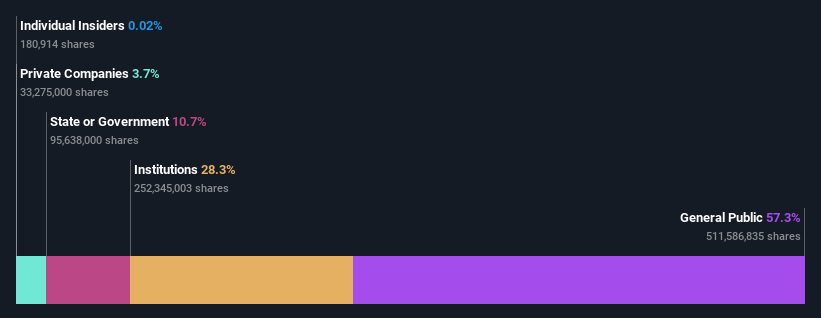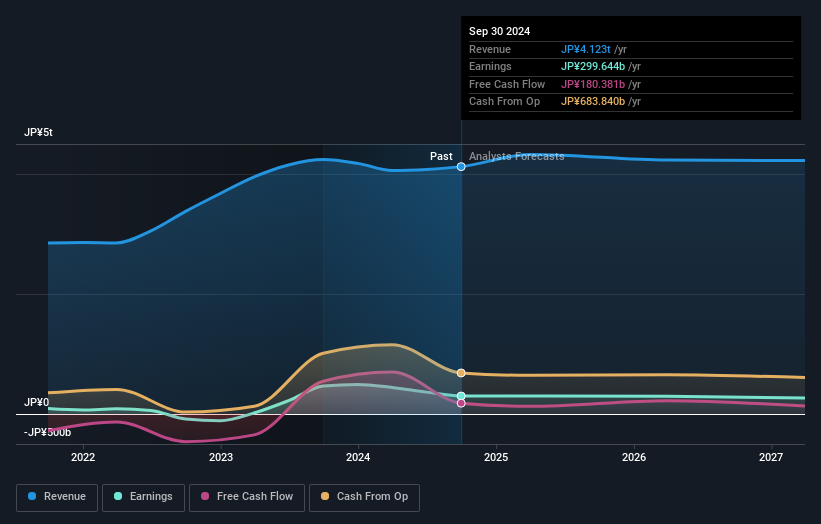- Japan
- /
- Electric Utilities
- /
- TSE:9503
The Kansai Electric Power Company, Incorporated's (TSE:9503) 5.6% loss last week hit both individual investors who own 57% as well as institutions

Key Insights
- The considerable ownership by individual investors in Kansai Electric Power Company indicates that they collectively have a greater say in management and business strategy
- The top 25 shareholders own 42% of the company
- Institutional ownership in Kansai Electric Power Company is 28%
A look at the shareholders of The Kansai Electric Power Company, Incorporated (TSE:9503) can tell us which group is most powerful. We can see that individual investors own the lion's share in the company with 57% ownership. In other words, the group stands to gain the most (or lose the most) from their investment into the company.
While institutions, who own 28% shares weren’t spared from last week’s JP¥92b market cap drop, individual investors as a group suffered the maximum losses
In the chart below, we zoom in on the different ownership groups of Kansai Electric Power Company.
See our latest analysis for Kansai Electric Power Company

What Does The Institutional Ownership Tell Us About Kansai Electric Power Company?
Institutions typically measure themselves against a benchmark when reporting to their own investors, so they often become more enthusiastic about a stock once it's included in a major index. We would expect most companies to have some institutions on the register, especially if they are growing.
We can see that Kansai Electric Power Company does have institutional investors; and they hold a good portion of the company's stock. This implies the analysts working for those institutions have looked at the stock and they like it. But just like anyone else, they could be wrong. If multiple institutions change their view on a stock at the same time, you could see the share price drop fast. It's therefore worth looking at Kansai Electric Power Company's earnings history below. Of course, the future is what really matters.

Kansai Electric Power Company is not owned by hedge funds. Looking at our data, we can see that the largest shareholder is City of Osaka with 7.6% of shares outstanding. With 5.3% and 3.3% of the shares outstanding respectively, BlackRock, Inc. and Nomura Asset Management Co., Ltd. are the second and third largest shareholders.
A deeper look at our ownership data shows that the top 25 shareholders collectively hold less than half of the register, suggesting a large group of small holders where no single shareholder has a majority.
While studying institutional ownership for a company can add value to your research, it is also a good practice to research analyst recommendations to get a deeper understand of a stock's expected performance. There are a reasonable number of analysts covering the stock, so it might be useful to find out their aggregate view on the future.
Insider Ownership Of Kansai Electric Power Company
While the precise definition of an insider can be subjective, almost everyone considers board members to be insiders. The company management answer to the board and the latter should represent the interests of shareholders. Notably, sometimes top-level managers are on the board themselves.
Most consider insider ownership a positive because it can indicate the board is well aligned with other shareholders. However, on some occasions too much power is concentrated within this group.
Our most recent data indicates that insiders own less than 1% of The Kansai Electric Power Company, Incorporated. We do note, however, it is possible insiders have an indirect interest through a private company or other corporate structure. As it is a large company, we'd only expect insiders to own a small percentage of it. But it's worth noting that they own JP¥314m worth of shares. It is good to see board members owning shares, but it might be worth checking if those insiders have been buying.
General Public Ownership
The general public -- including retail investors -- own 57% of Kansai Electric Power Company. With this amount of ownership, retail investors can collectively play a role in decisions that affect shareholder returns, such as dividend policies and the appointment of directors. They can also exercise the power to vote on acquisitions or mergers that may not improve profitability.
Private Company Ownership
We can see that Private Companies own 3.7%, of the shares on issue. It might be worth looking deeper into this. If related parties, such as insiders, have an interest in one of these private companies, that should be disclosed in the annual report. Private companies may also have a strategic interest in the company.
Next Steps:
It's always worth thinking about the different groups who own shares in a company. But to understand Kansai Electric Power Company better, we need to consider many other factors. Consider for instance, the ever-present spectre of investment risk. We've identified 5 warning signs with Kansai Electric Power Company (at least 3 which are a bit concerning) , and understanding them should be part of your investment process.
But ultimately it is the future, not the past, that will determine how well the owners of this business will do. Therefore we think it advisable to take a look at this free report showing whether analysts are predicting a brighter future.
NB: Figures in this article are calculated using data from the last twelve months, which refer to the 12-month period ending on the last date of the month the financial statement is dated. This may not be consistent with full year annual report figures.
Valuation is complex, but we're here to simplify it.
Discover if Kansai Electric Power Company might be undervalued or overvalued with our detailed analysis, featuring fair value estimates, potential risks, dividends, insider trades, and its financial condition.
Access Free AnalysisHave feedback on this article? Concerned about the content? Get in touch with us directly. Alternatively, email editorial-team (at) simplywallst.com.
This article by Simply Wall St is general in nature. We provide commentary based on historical data and analyst forecasts only using an unbiased methodology and our articles are not intended to be financial advice. It does not constitute a recommendation to buy or sell any stock, and does not take account of your objectives, or your financial situation. We aim to bring you long-term focused analysis driven by fundamental data. Note that our analysis may not factor in the latest price-sensitive company announcements or qualitative material. Simply Wall St has no position in any stocks mentioned.
About TSE:9503
Kansai Electric Power Company
Engages in electricity, gas and heat supply, and telecommunication businesses in Japan.
Very undervalued with mediocre balance sheet.
Market Insights
Community Narratives




